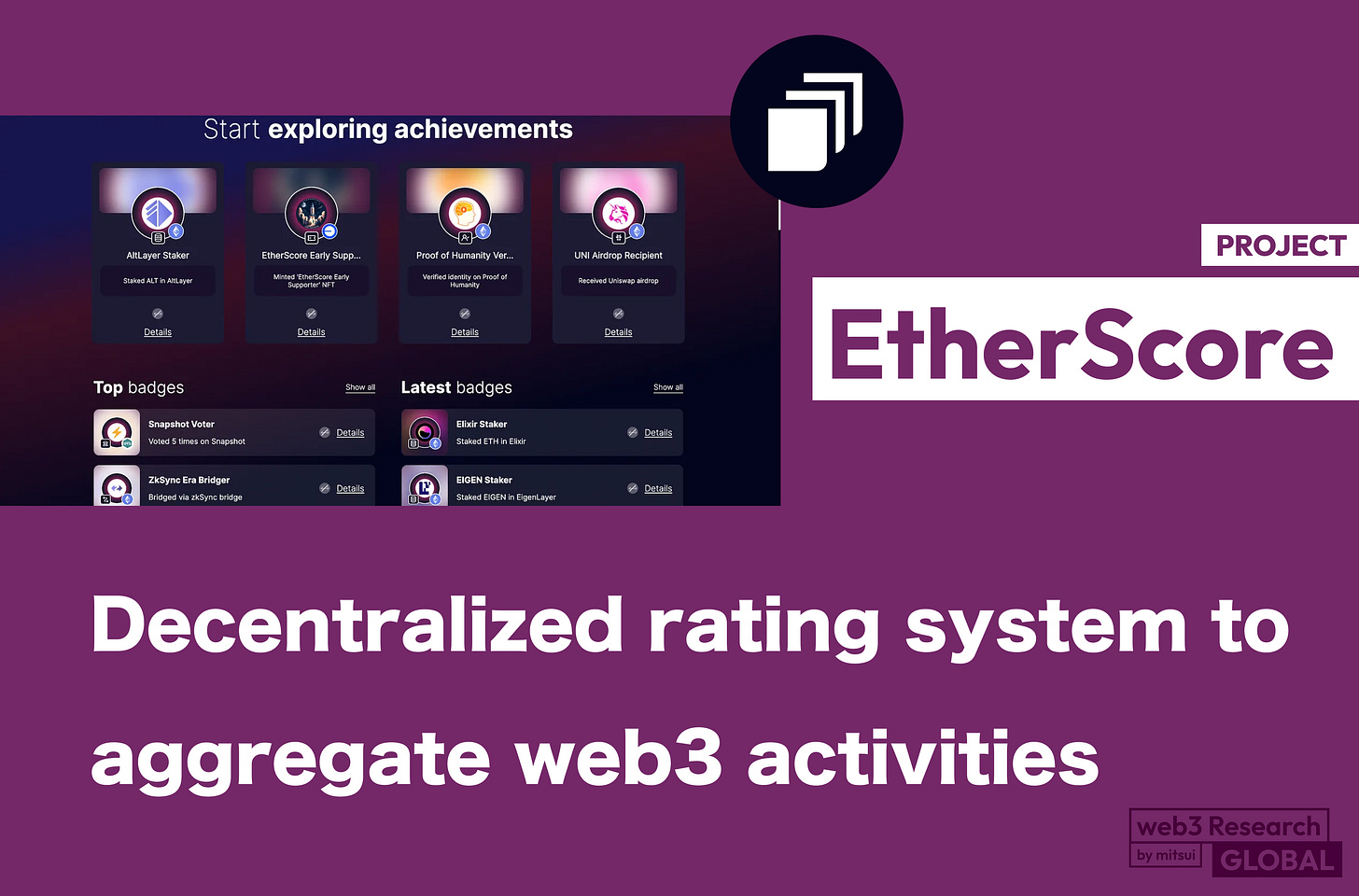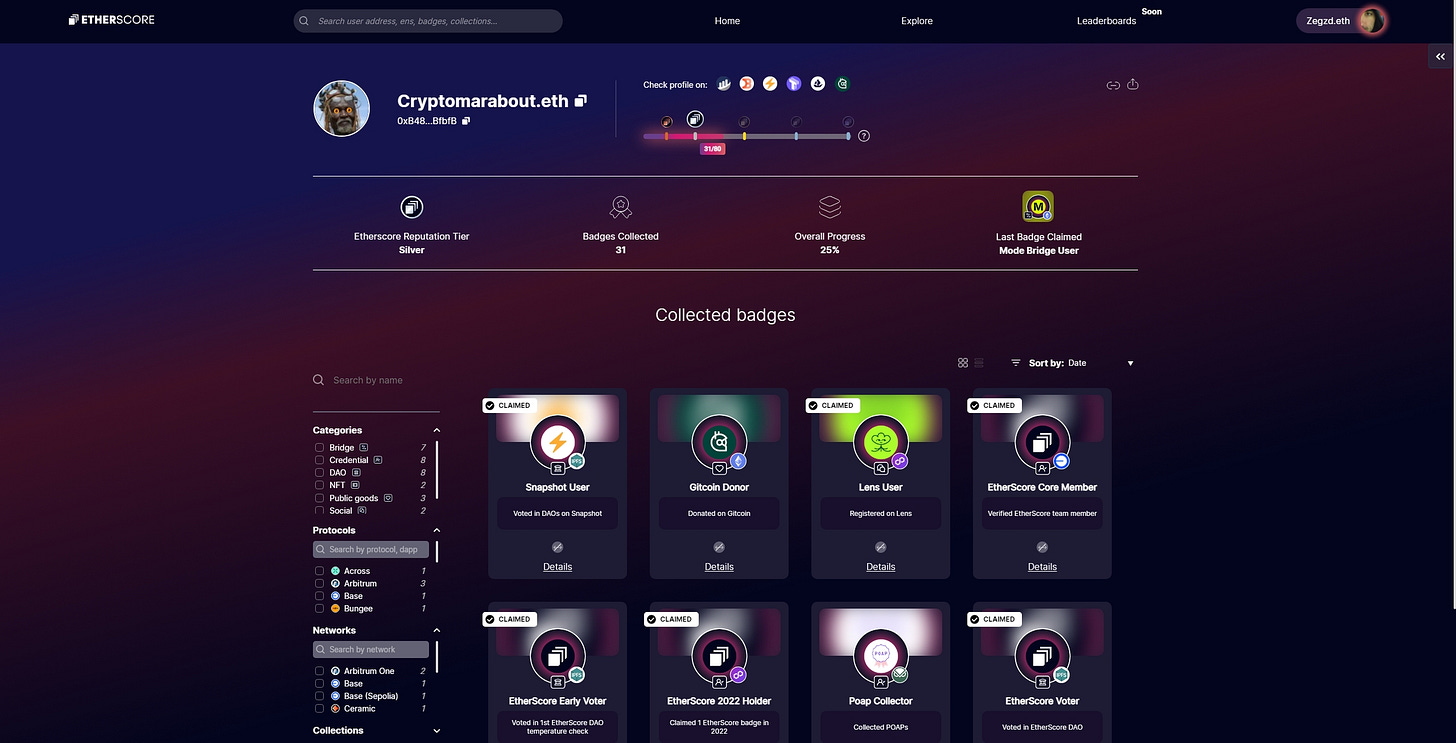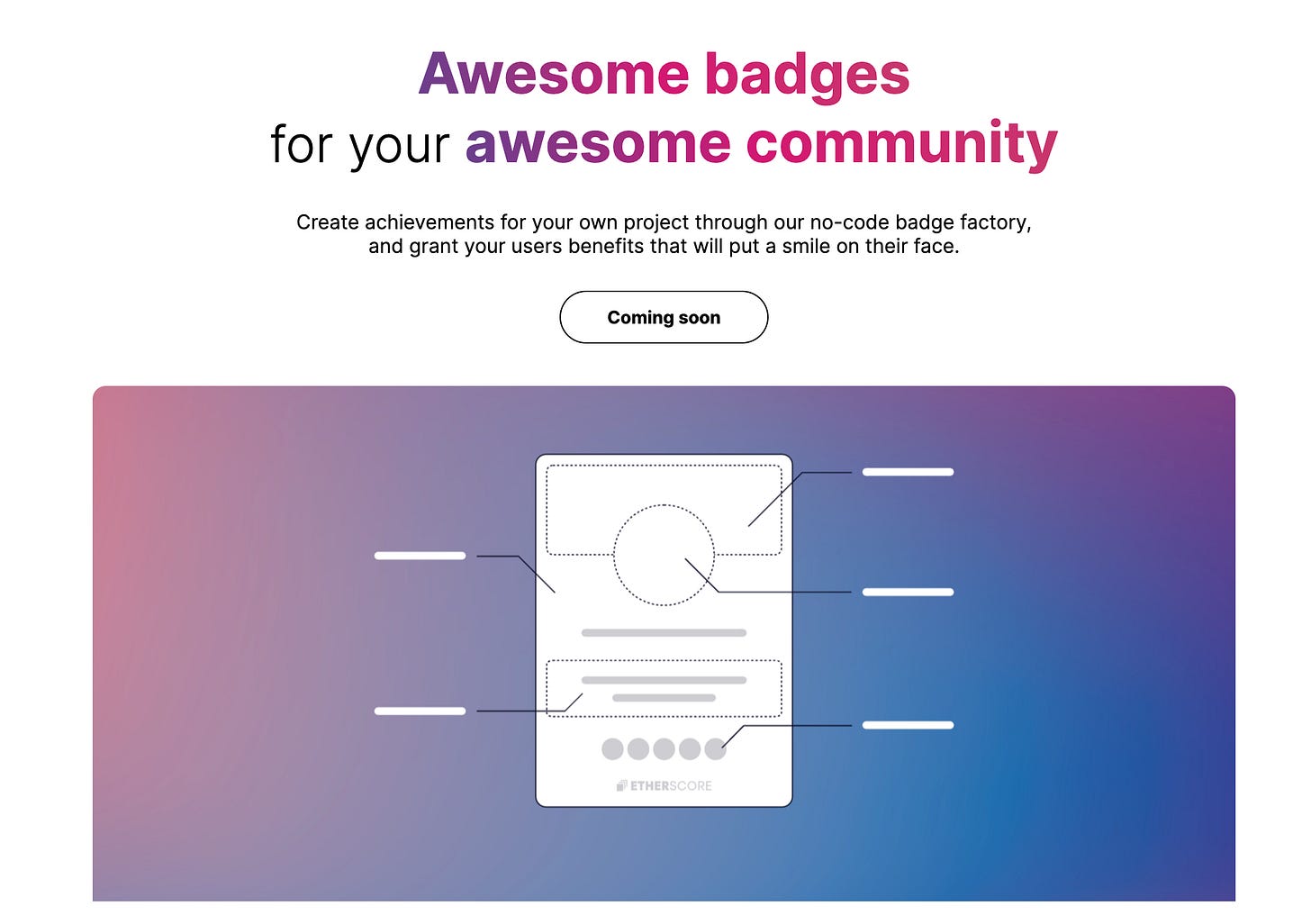【EtherScore】Decentralized rating system to aggregate web3 activities / Distribute on-chain activities as badges and create profiles / @EtherScore
The importance of DID is going up.
Good morning.
Mitsui from web3 researcher.
Today we researched "EtherScore".
🟣What is EtherScore?
✨Reputation system on the blockchain to correctly rate people
💬 Reputationimportance is improving.
🟣What is EtherScore?
EtherScore is a distributed rating system that uses badges to create user profiles that aggregate web3 activity.
For example, it defines any action on the on-chain, such as voting on Snapshot, staking on EigenLayer, swapping on Uniswap, etc., and awards badges to those who do so.
This badge is an NFT, and as badges accumulate, a profile on the person's on-chain is created.
As well as the list of badges earned, the profiles have tiers based on the number of badges.For example, 10 badges are Bronze and 20 are Silver.
This tier is related to on-chain reputation and the current specific utilities include additional voting rights on EtherScore DAO and limited rolls on Discord.
The initial badges were all SBTs, but now they are transferable, burnable, etc., and can be set by badge.In addition, the EtherScore Badges Factory, where each community can create badges with no code, will be released soon to make it easier for everyone to create badges.
In addition, the EtherScore SDK will be released soon to integrate badge and profile functionality into Dapps.
✨Rating people correctly with a reputation system on the blockchain
EtherScore" has been active since 2021.Its sense of challenge is the lack of a reputation system in the blockchain domain.
As a result, it is difficult for applications to identify and reward users.The specific harm is mainly due to Bot and speculator attacks during DAO governance attacks and airdrops.
It has become a vicious circle, as it is not possible to grant proper voting rights to real users and rewards for airdrops, and in particular, Bot and speculators get most of the airdrop rewards.
However, this issue has been implicit in the past, since the application side has also been a part of the token price increase to secure attrition and large amounts of money.
Nevertheless, the recent spate of sharp declines in activity after the end of airdrops has led to a growing trend that it is important to design a meaningful airdrop.
EtherScore" is a protocol that solves this sense of challenge.
Of course, the application side also tracks user behavior for airdrops and does some filtering, but this is limited to a single application and not across the ecosystem.
EtherScore creates a single profile that aggregates reputation across all ecosystems, so the application can determine that it is not a bot, and helps select real users.
And we are also experimenting with DAO governance.
The EtherScore DAO grants voting rights to "EtherScore Badge" holders, giving them one vote per Badge.Although this is an alpha version and an experiment, it was noted that the granting of voting rights according to Badge will continue in the future.
Currently, governance of DAOs is also an issue.The bottom line is the issue of declining turnout and the resulting takeover: turnout is declining because the incentive to vote for DAOs is diminishing.As turnout declines, it becomes easier to get a majority of the vote, allowing the whales to take a majority of the vote and pass proposals that favor them through formal channels.
↓For more information.
Voting rights based on the Badge of the EtherScore DAO have the advantage that voting rights are not fixed and continue to grow.Previously, basic DAOs had an upper limit because voting rights were tied to tokens.This allowed for a certain amount of planning against hijacking by whales.It was also very difficult to recover after the takeover.
Voting rights based on Bagde on the other hand will continue to grow forever.Thus, we hypothesize that it will be harder to hijack.
In the first alpha version, it is one Bagde and one vote, but they are considering changing the weight of the vote for each Badge in the beta version.
💬The importance of reputation is improving
The last is a consideration.
I used to understand the concept of DID-like protocols, but I did not know if there was actually a demand for them.Recently, however, my thinking about DID has changed, and I have come to believe that it is actually a very important part of the ecosystem.
I think it is true that the DID protocol has not been very successful in the past.This was due to the fact that there was not that much on-chain history to begin with, and there was no need for DID authentication.
Finally, on-chain history is gradually emerging, and furthermore, the airdrop issue and DAO governance issues have increased the need to detect whether or not a person is really a person, and what kind of person or user he or she corresponds to.
World ID is expanding the use of IDs by partnering with various projects, and we should see more and more uses of IDs in this way.The movement toward human authentication is likely to accelerate in the future as well.
In this context, "EtherScore" is in a fairly royal position.
It is an orthodox protocol in terms of functionality that can issue badges of on-chain activity in any chain and create profiles for them.Other similar protocols to POAP would be Galxy, phi, etc.
Personally, I think it will be a few more years before a reputation system like DID is really needed, but I still think it will be quite important.It will be too late to rush to create one when that time comes, so we will continue to pay attention to "EtherScore," which is taking its position now, and follow its information!
This is my research on "EtherScore"!
🔗Reference/image credit: HP / DOC / X
Disclaimer:I carefully examine and write the information that I research, but since it is personally operated and there are many parts with English sources, there may be some paraphrasing or incorrect information. Please understand. Also, there may be introductions of Dapps, NFTs, and tokens in the articles, but there is absolutely no solicitation purpose. Please purchase and use them at your own risk.
About us
🇯🇵🇺🇸🇰🇷🇨🇳🇪🇸 The English version of the web3 newsletter, which is available in 5 languages. Based on the concept of ``Learn more about web3 in 5 minutes a day,'' we deliver research articles five times a week, including explanations of popular web3 trends, project explanations, and introductions to the latest news.
Author
mitsui
A web3 researcher. Operating the newsletter "web3 Research" delivered in five languages around the world.
Contact
The author is a web3 researcher based in Japan. If you have a project that is interested in expanding to Japan, please contact the following:
Telegram:@mitsui0x
*Please note that this newsletter translates articles that are originally in Japanese. There may be translation mistakes such as mistranslations or paraphrasing, so please understand in advance.








